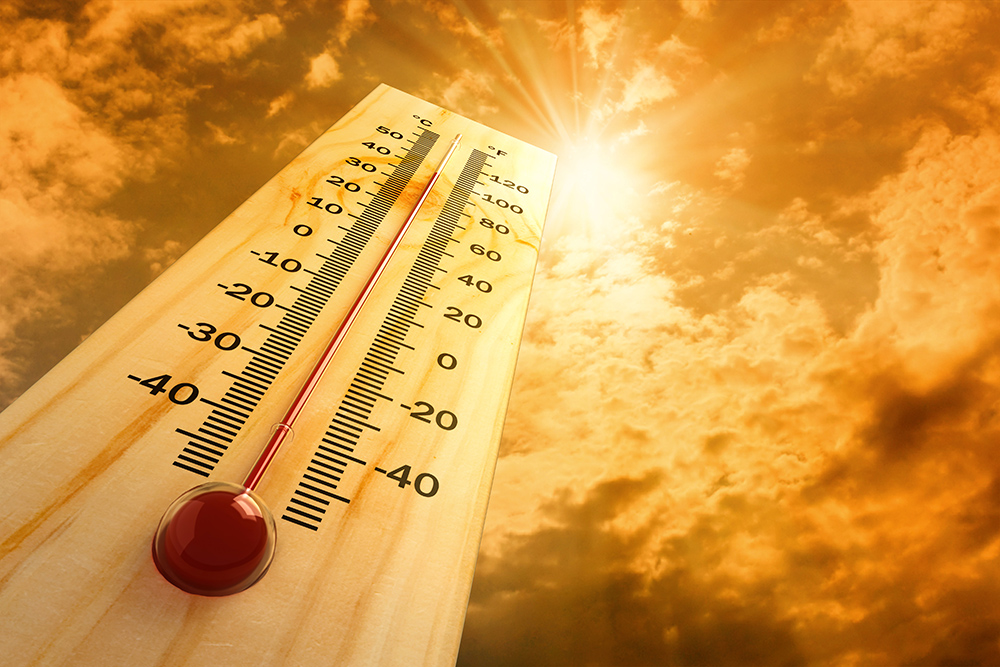Oppressive summer temperatures can lead to heat-related illness, which means it is important to take the appropriate safety-measures, and know how to protect yourself and your loved ones. Dr. John Marshall, Chair of Emergency Medicine at Maimonides Medical Center, urges everyone to take proper precautions to prevent heat-related illness during the scorching days of summer.
“The body cools itself naturally by allowing heat to escape through the skin, which is called perspiration,” explains Dr. Marshall. “If the body doesn’t cool properly or doesn’t cool enough, a person may suffer a heat-related illness.”
It’s especially important to be aware of the increased risk of heat-related related problems among seniors, people with chronic physical or psychiatric conditions, and young children and babies whose skin surface to body mass ratio is low—in other words, they often can’t perspire enough to cool down.
Under some conditions, sweating isn’t enough even for healthy and fit adults. A person’s body temperature can rise rapidly, potentially leading to heat stroke. Summertime activities should be balanced with habits that aid the body’s cooling system and prevent heat-related illness.
Dr. Marshall shares these strategies for staying safe in the heat:
- Drink more fluids (non-alcoholic) regardless of your activity level – don’t wait until you’re thirsty.
- Avoid caffeinated, alcoholic and sugary beverages, as these liquids actually cause you to lose fluid and can lead to dehydration. Also avoid extremely cold drinks, which can lead to stomach cramps.
- Stay indoors during the warmest hours of the day, and, if possible, in an air-conditioned space.
- When you are outdoors, wear lightweight, light-colored, loose-fitting clothing, and a wide-brimmed hat to deflect the sun’s harmful rays.
- Limit outdoor exercise. If you must exercise outdoors, remember to stay hydrated by drinking two to four glasses of cool fluids each hour.
- Pay attention to weather reports. You are more at risk as the temperature or humidity rises, and when there’s an air pollution alert in effect.
- Avoid hot foods and heavy meals – they add heat to the body.
- NEVER leave anyone in a closed, parked vehicle without air-conditioning – including pets.
- Develop a neighborhood prevention plan. Identify those without air-conditioning and assign neighbors to check on those who are at greater risk for developing heat-related illness.
“It’s easy for people to overlook their own risk for heat-related illness,” noted Dr. Marshall. “Anyone can be susceptible to heat-illness, and it can become serious or even deadly if left untreated.”
Symptoms of heat-related illness can include: fatigue; nausea and vomiting; headache; excessive thirst; muscle aches and cramps; weakness; dizziness, vertigo or fainting; drenching sweats, often accompanied by cold, clammy skin; rapid heart rate; slowed or weakened heartbeat; and shortness of breath.
If you must be outdoors in the heat:
- Limit your outdoor activity to morning and evening hours.
- Use sunscreen with a minimum of SPF 30. A sunburn can limit the skin’s ability to cool itself. Sunscreen will prevent sunburn when applied properly and regularly.
- Take frequent breaks when doing any physical labor.
To get quick relief after exposure to the heat, take a cool shower or move to an air-conditioned space. Electric fans may provide comfort, but when the temperature is in the 90s or above, fans will not prevent heat-related illness.
If your home does not have air-conditioning, go to a nearby shopping mall, public library, movie theatre, or any other venue that’s cooler than your home – even a few hours spent in air-conditioning can help your body stay cool when you go back into the heat. You can also contact your local health department to see if there are heat-relief shelters in your area.
If you suspect that someone is suffering from a heat-related illness, call 911 for immediate medical attention.
Maimonides Medical Center is nationally recognized for clinical excellence across all major specialties. Our accomplished physicians are known for innovation and strengthening our teaching and research programs. With 711 beds, the Medical Center is dedicated to bringing patients the most advanced care available—anywhere. Maimonides continues to grow in response to evolving models of care that better serve patients and families, and is an affiliate of Northwell Health. To learn more, please visit www.maimonidesmed.org.




